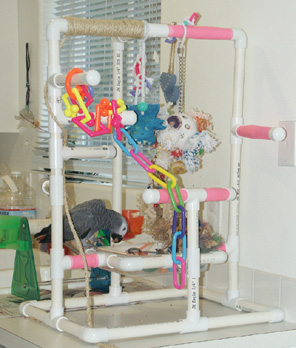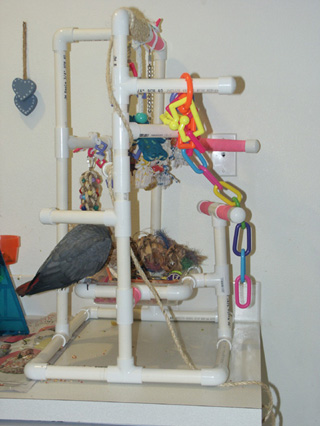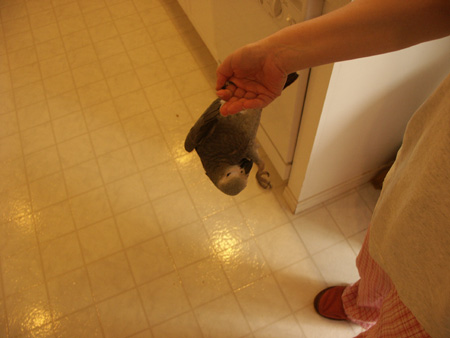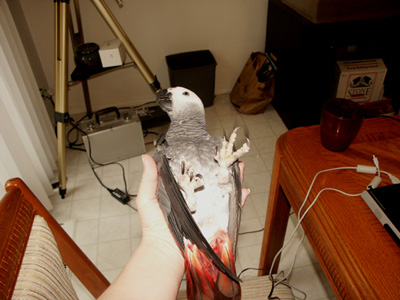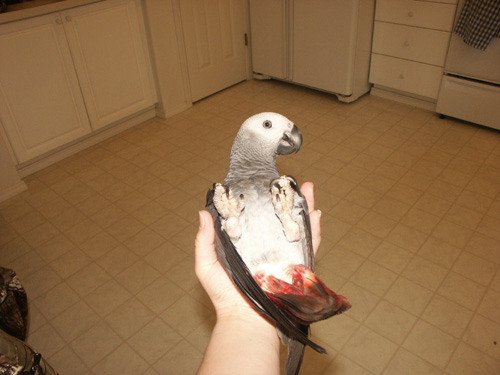NEW ADDRESS FOR MEMBERS GREYFORUMS.ORG
-
Posts
193 -
Joined
-
Last visited
Content Type
Profiles
Forums
Events
Gallery
Everything posted by zandische
-
Ok, I'm showing off a bit here but I can't help it! I'm so happy that this gym turned out the way it did. And I'm even happier that Athena LIKED it so quickly! This gym is made from 3/4" pvc and is 16" w x 20" d x 29" high. (If I had more space I think I would've made it about 5-10" wider) About 6" off the ground is a center foraging basket that holds a removable tupperware box. You can't see it in these pictures because it's not quite complete yet, but I've wrapped all the perches in vet wrap and I'm working on 1/4" sisal up all the vertical poles to make it easier for her to climb to the upper levels. If you guys are interested, I'll scan my plans and measurements for you. As you can see, it didn't take her long (a day!) to figure out that this was a fun spot to hang out! <br><br>Post edited by: zandische, at: 2008/05/06 06:50
-
Dave007 wrote: danmcq wrote: What I've read on the internet and in talking to other people who own greys is that they tend to be species-specific. So they will generally be more welcoming of their own kind but less apt to accept other species like amazons, macaws etc. One lady who owns a bird store near where I live has a timneh and a congo who can't be in the same room together. And a friend's Grey bites the toes off his cockatiels if they get too close. On the flip side, my breeder raised my grey (and all of her other greys) around Moluccans and they all get/got along famously (my girl actually shows off some 'too traits from time to time.) I think that perhaps the complexity of Grey personalities and their naturally more reserved nature probably makes them treat other birds with as much caution (and perhaps more) than people. Of course, considering how much less attention they get when you split your time between two, three or more birds, it makes sense that they could develop extremes such as bonding or attitude problems toward the other birds. The ideal is definitely when all of them are willing to share just the one of you. But what bird ever does what she's supposed to do? :silly: I think it would be awesome to adopt another bird that is a little more outgoing (like an amazon or a mini-macaw) and might be able to teach my girl a few social skills or fun antics. I also think it would be awesome to have a flock of greys (ok, 2 or 3) because Athena has made me totally in love with all things GREY. But I think that since Athena picked me, the only other bird that is ever going to come home with us is going to be one she decides she likes too. But what happens if she decides she likes a boooooooyyy? Oh no!
-
Just wanted to add my experience on this. I began sprouting about two months ago. The only seeds I've sprouted successfully so far are quinoa and lentils; I'd like to try buckweat and rice but haven't managed to get any that will sprout yet. Anyway, Athena just LOVES the sprouts! She gets them every day and I have to tell you, there is a VERY noticeable difference in her feather sheen, her activity level and her general demeanor. I don't really worry about bacteria; I always rinse them well before I feed them to her and I make them fresh every day. I usually mix a teaspoon of sprouts in her mash in the morning, sprinkle a couple teaspoons on top of her seeds for the day, and mix another teaspoon in with dinner. During the weekends I used to give her seeds to snack on during the day - now I just put a couple of teaspoons of sprouts in her kitchen bowl and she goes nuts for them. It's made an amazing difference for her, and I would HIGHLY recommend sprouts to anyone looking for better Grey nutrition! (FYI, I have also switched to organic produce, sugar free/gluten free/sulfide free/salt free treats and lowered her daily seed allowance from 1 cup a day to around 1/4 cup seed with dried veggies/fruits/pellets. She also loves orange juice and my local bird store has an interesting article on "juicing" for birds that I'm going to try as soon as I get a juicer. You can read it here: http://www.birdsparadiseinc.com/Nutrition/tabid/65/Default.aspx - go to the "Juicing for lifelong health" link. ) It's amazing what good nutrition can do for your grey!
-
BMustee wrote: What IS it about the cold baths? Athena loves it if her water is ice cold - even if she starts shivering half way through the bath! I am so worried she is going to get too chilled so I keep trying to give her warm water, but she won't go near it if it isn't cold!
-
Hi guys, I am going on vacation this summer and after our experience at Christmas when I boarded Athena, I am thinking I'd really prefer to take her with me. Have any of you actually traveled on a plane flight with your bird (preferably extended flights - mine will probably be 4-5 hours) and can you share your experiences? This will be on a US airline and I'd be taking my bird in the cabin with me. (She is just over a year old) Mostly, I'm worried about the noise (planes are loud, and I'm worried it will frighten her being on the floor) and her fear/stress levels. Now that the weather is warming up we're going to start going to local places and meeting people, but I'm really concerned how other greys have handled this kind of travel.
-
Nychsa - that would be a hilarious video if you could get it on film! I wanted to add another cute tale that happened just the other day. Normally when I open up Athena's cage I'll reach in and take her out. But I was busy the other day, making dinner or something, so I just opened the top part where she likes to sit, figuring she'd come out on her own. She became very indignant -squawking, jumping on the sides of her cage - obviously, she had not counted on having to actually work to get out of her cage! Thinking this would be a good opportunity for her to figure it out on her own, I went to the kitchen and started encouraging her to "come on." Finally, huffing and puffing, squawking and squeaking, she pulled herself up onto her perch shelf and scrambled to the edge. Then she promptly fluffed up and said "Good bird!"
-
Falconeer - Congrats on your new baby! I brought home Athena at 14 weeks and although the breeder said she was fully weaned, she really needed another 2 months before she was interested in real food and not the baby formula. I was very cautious about hand feeding because I was so scared of hurting her, but we made it through eventually 1 - Although I don't have any quantitative evidence to offer, I'm pretty sure it's easier than you may think. The first time I met Athena at 12 weeks old, she practically leaped into my arms. Like you, she went right to me. I then came back to visit her a day later and I thought it would be prudent if I tried to recreate a similar environment to the day before - same smells, same colors, etc, just so I could make sure she didn't forget me. This, I thought, had proved to work, because once again she was my little darling. Then a week later I went to visit her just before picking her up and I forgot to do those things. I got to the breeder and thought she might not recognize me, but as soon as she saw me she got excited and hopped right on over to see me (she couldn't quite perch yet, so they had her in a plastic baby pool where she could waddle around without falling). I've read that in the wild, Greys live in very close proximity to each other, even during breeding, and that they thrive on constant contact with their flock. There have also been numerous reports and some studies about their seemingly supernatural "empathy." So in my mind, it stands to reason that smell and sound would play a key factor in recognition, and certainly your role as the "parent bird" right now means recognizing you is all important to their survival, but I think it more likely they initially learn to recognize each other by their various personality traits, and that's what really nails it down for them. But of course, that's just my opinion based on my experiences with my bird. Someone else might have a much more scientific answer 2 - I'd vote no on the bad-tasting spray, for a couple of reasons. One, he's probably just testing out that baby beak and doesn't understand that your fingers aren't chewable, so it's easy to correct that behavior simply by changing YOUR behavior. In a month or so he's going to realize those fingers can do amazing things - like give tons of great head scratches. But if he learns early to associate a bad taste with your fingers, he may decide to reject your fingers altogether, and that could lead to other problems. Secondly, since feather plucking isn't usually something found in babies, I'd be very cautious about him ingesting any kind of chemical designed to prevent it in older birds. I'd be cautious about giving my bird any kind of chemical anyway, but particuarly so in this case -it's possible his body may not be able to handle the ingredients in the spray at this age. My suggestion is that if he bites your fingers, either change your tactic a bit (instead of rubbing his belly, rub behind his head where he can't get you etc), distract his attention, or offer him a toy to chew on instead and contnue with whatever you were trying to do. Definitely don't allow him to continue chewing on you though. Remember that at this stage everything he is going to learn in life he learns from you, so it's important to show him all the things he CAN do (like chew on toys.) If he does something he's not supposed to do, instead of giving him a consequence for doing it (like the spray), show him that it's not ok with a gentle "No" and then point his attention back to what he SHOULD do - which is chewing on toys again. Then reinforce this good behavior with excitement, praise and love. He will figure it out very quickly that chewing on fingers makes you stern and reserved, whereas chewing on toys makes you laugh and pay attention to him. Anyhow, I'm certainly no expert so that's just another opinion from the peanut gallery, but overall the spray just seems like a potentially bad idea. Good luck with Dennis and keep us posted about him!<br><br>Post edited by: zandische, at: 2008/03/18 00:02
-

What is your daily routine with your grey??
zandische replied to Nekkyousha's topic in The GREY Lounge
Awww, your grey sounds like a sweetheart Athena is a bit of a t-rex at eating time. There is definitely no cuddling till AFTER the little beast is fed Usually I get her up about an hour before I go to work. I spend a few minutes preening her face while she's on her cage perch and this seems to help her wake up. Then I go to the kitchen and start making her breakfast - usually a mix of warm pellets, baby food or oatmeal. She'll hear the microwave or the pantry door and come to investigate. While she's eating I change her cage paper, wipe down the cage and refill her water and seed dishes. Then we "snuggle" for the remaining few minutes, which can be anything from her snuggling up to my head while I'm on the couch or her just preening herself on my shoulder. Then it's back to the cage and I'm off to work. When I get home I let her out of the cage and make her dinner, which is a mix of fresh veggies and fruits and whatever I'm having for dinner. After that she usually plays with her toys for an hour or so, then we spend the next few hours watching tv with Daddy (she sits on my shoulder and receives lots of head scratches). Of course, that all changes as sometimes we work out, clean house or do other things. Most of the time in the evenings she doesn't really care where we are or what we're doing, as long as she can be included As for training, I try to incorporate that as a regular part of our interactions. At this point she is so young (a year) that most of what I'm training her IS stuff that we'll want to use all the time. Things like flying to me when I call her, staying put, eating certain foods, stepping up, not biting, and potty training are all things that we reinforce the entire time we're with her. These may not be natural to her wild brain, but they are the basic building blocks of our relationship, so I try to be as patient as possible to reinforce these things all the time. I'm not terribly interested in teaching her to do "tricks" at this stage of the game (although she's learned a few on her own) but I do talk to her often. It's having a really positive effect as over the last 2 months her vocabulary has gone through the roof! Anyhow, good luck teaching your grey and keep us updated on her progress!<br><br>Post edited by: zandische, at: 2008/03/17 23:06 -
Hi Lyric, just wanted to add my experience with Athena (who is also fully flighted). When she first came home she was a holy terror at dinner time, because not only did she want to eat everything on our plates, but she wanted to start eating it while it was being prepared. I got so frustrated that at first I just kept putting her in her cage, but then I decided I didn't really want to teach her that way. So I started working with her and the "Stay" command. It was very hard at first - I think the first few times I did it I had to return her to her perch around 30 times. But every time I would say "Stay!" then walk a few steps away, pause and tell her she was a good bird. Eventually, it just "happened" one night. I took her back to her perch while I was mixing up her dinner and it was about five minutes before I realized she was still there! When I looked over, she had -that- look, as if to say, "I better get a kiss for this!" Since then she's been very good about letting me make dinner and THEN dive bombing me for it. Occasionally she will hop down on the counter and slink past the sink toward the cutting board, thinking I don't see her. Then when I ask her what she thinks she's doing, she chirps as if asking for permission. It is so cute. Back to the perch we go, but usually not without a little piece of whatever veggie I'm cutting up for the effort
-
I do try to minimize the amount of cheese she gets but I thought that was an interesting "opinion" from an avian vet. Of course, common sense tells me we can find other, better sources of calcium out there that aren't potentially harmful! I even found a "healthy" pasta the other day that has extra calcium added to it. Oh, I tried giving her a chicken wing bone tonight and she went nuts! I thought she'd thrown it out of her bowl at first, until I realized that no, she'd chewed it up, sucked out the marrow and thrown the "rest" on the counter! By the way, the first thought that came to my mind after that was a worry about bone shards. Do any of you also harbor that fear?
-
This thread discusses the Content article: My Problem with my Grey Hi Jeannine37! I would suggest you try to find a local bird rescue where you can place Traveller. They are usually very dedicated people who are willing to work with your bird on his behavioral problems and help find him a loving home with people who are experienced with working through these kinds of issues. You're right to be leery of just giving him away and to let people know up front about his needs but honestly, a rescue is where you want to go. They have people who deal with these kinds of situations every day! I'm not sure where you're located but there are several really good rescues on the USA west coast I could point you to if that is close to you.
-
I like to think Athena snuggles with me. She doesn't curl up under my chin anymore like Bella does for Nychsa (she used to do that when she first came home but seems to have grown out of it)- most of the time she just wants to sit on my shoulder. But shoulder sitting involves (in HER opinion) a great deal of attention, meaning she gets head rubs - the famous head cup routine is her favorite, allopreens (not just my hair but ALL OVER my face), and generally spends 1-2 hours a day allowing me to scratch her beak, eyes, chin and head. She solicits a lot of kisses from that position too! Sometimes in the morning I'll give her a few minutes of "quiet time" where I sit on the couch and she sits on my shoulder and snuggles up to my ear. She really likes it when I lightly stroke her breast or down the middle of her back during these times. Once I fell asleep like that and she was just content to stay snuggled. It's so amazing to hear her little bird heart thumping away! Oh, I also give her hugs which she tolerates, but only when she's on her cage perch. She's higher than me up there(I'm pretty short as it is!) so when I wrap my arms around her she knows I'm not a threat. <br><br>Post edited by: zandische, at: 2008/03/15 07:40
-
I've been wanting to try the aloe idea. Athena doesn't like misting of any kind and she's not particularly fond of showers. Every couple of days though she likes to dance around in a shallow baking dish and get her wing tips, breast and tail wet. I wish she would get the back wet, but she expressly doesn't like that. As for that birdy "smell" - I've gotta say I love her smell. She just always smells clean and fresh to me, not a soapy clean but just a "natural" clean!
-
My vet actually recommended cheese to me. She said a little piece once a day, or every few days, won't hurt my bird and will help with the calcium. As for meats, Athena goes nuts over most meat. She particularly likes salmon and shrimp, but she's also had chicken, beef and pork and loved all of them. I'll definitely have to try giving her a bone next time. I didn't know they would like the marrow!
-

Cosmo is constantly trying to get in my mouth!!
zandische replied to jimmycoop2005's topic in The GREY Lounge
-sorry, double post!<br><br>Post edited by: zandische, at: 2008/01/16 21:40 -

Cosmo is constantly trying to get in my mouth!!
zandische replied to jimmycoop2005's topic in The GREY Lounge
Athena likes to do this as well and is most interested in it when she's hungry. I think it has something to do with the bird's baby instincts, since these birds expect their parents to feed them and in the wild, their parents would naturally feed them from their beak/mouth. Sometimes though, I think she just does it to be ornery -
Marir - Athena is 7 months. Lovemygreys - thanks for the list! She does get a lot of those items on a regular basis. So maybe I worry for nothing!
-
These stories are great! Athena is still young (7 months) but she has figured a few things. She particularly loves giving the cats a hard time - she dive bombs them on a regular basis and will fluff up at them if they even walk near her cage. Occasionally one will hop up on my lap and a few times she's lunged at them, which resulted in much no-noing on my part. A couple of months ago I was sitting at the kitchen table (surfing the internet) with Athena on my shoulder, happily preening the both of us. Then my husband called and I was so busy chatting with him that I didn't even notice when one of the cats jumped up on my lap. All of a sudden I felt Athena lunge and I knew the poor cat was in for it. I looked over and she abruptly froze, cat's tail still in her beak. The look she gave me was priceless! Her eyes got wide and she opened her beak just enough for the tail to slip out - just like the classic picture of the dog who gets caught about to eat the cat. So I told her "No!" and she shook her head, then did it again - but this time, she pulled the cat's tail in so she could grab it with her foot, and then she started preening! Now whenever a cat gets up on my lap, they get a free tail grooming courtesy of the bird. She'll even nibble an ear or give a kiss if she's feeling particularly generous. It almost makes up for the dive-bombing, but not quite. They still lick their lips when she's not looking
-
Hannah Rae - I have read that natural or pure oil fragrances (such as in Yankee candle) have less potential to be harmful. Here is a link to a yahoo post that describes some issues with candles and the responses from various people: http://sg.answers.yahoo.com/question/index?qid=20071007183548AAlbLOi personally, I only use unscented candles and a butane lighter, no matches. If I want my house to smell "good", I bake something.
-
This one is of me and Pooh-bear, Athena's arch rival. I would call them enemies, except neither is particularly interested in eating the other. Instead, they just like to make each other jealous. (Which Pooh-bear was doing in excellent fashion here.)
-
-
and another (I took this one after a trip around the house): <br><br>Post edited by: zandische, at: 2007/10/13 20:28
-
Ok, I finally had the camera around while she was doing her back trick! Here's a couple of pics of Athena:
-
I think the keys in this discussion are 2 things, GreyBoy - 1) A solid relationship/environment for you and the bird and 2) hard work and socialization. I don't think it really matters if the parrot is male or female or the person is male or female. Parrots are individual animals, so you're never guaranteed that the bird will love only you forever. In fact, you should be prepared emotionally in case the bird decides to switch loyalties. But if you constantly work to have him meet and interact will different people, the theory is that he should be able to satisfy the varying needs and desires of his emotional development with the different people he knows and loves. Perhaps he loves you for nurturing and providing for him (aka, being the parent), but perhaps he will see someone else as his "partner," and perhaps even a different person will be his "playmate." Therefore, making him less apt to abandon you entirely for someone else. Part of socializing (at least that I've come to realize) is understanding that you CAN'T be everything for your bird and allowing him/her to form relationships with other people if the bird so desires.


